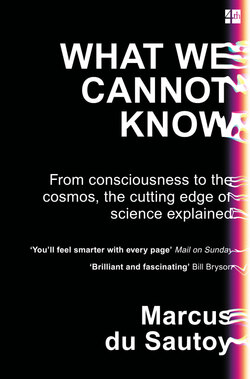Читать книгу What We Cannot Know - Marcus du Sautoy - Страница 17
PASCAL’S WAGER
ОглавлениеPascal and Fermat’s analysis of the game of points could be applied to much more complex scenarios. Pascal discovered that the secret to deciding the division of the spoils is hidden inside something now known as Pascal’s triangle.
The triangle is constructed in such a way that each number is the sum of the two numbers immediately above it. The numbers you get are key to dividing the spoils in any interrupted game of points. For example, if Fermat needs 2 points for a win while Pascal needs 4, then you consult the 2 + 4 = 6th row of the triangle and add the first four numbers together and the last two. This is the proportion in which you should divide the spoils. In this case it’s a 1 + 5 + 10 + 10 = 26 to 1 + 5 = 6 division. So Fermat gets 26⁄32 × 64 = £52 and Pascal gets 6⁄32 × 64 = £12. In general, a game where Fermat needs n points to Pascal’s m points can be decided by consulting the (n + m)th row of Pascal’s triangle.
There is evidence that the French were beaten by several millennia to the discovery that this triangle is connected to the outcome of games of chance. The Chinese were inveterate users of dice and other random methods like the I Ching to try to predict the future. The text of the I Ching dates back some 3000 years and contains precisely the same table that Pascal produced to analyse the outcomes of tossing coins to determine the random selection of a hexagram that would then be analysed for its meaning. But today the triangle is attributed to Pascal rather than the Chinese.
Pascal wasn’t interested only in dice. He famously applied his new mathematics of probability to one of the great unknowns: the existence of God.
‘God is, or He is not.’ But to which side shall we incline? Reason can decide nothing here. There is an infinite chaos which separated us. A game is being played at the extremity of this infinite distance where heads or tails will turn up … Which will you choose then? Let us see. Since you must choose, let us see which interests you least. You have two things to lose, the true and the good; and two things to stake, your reason and your will, your knowledge and your happiness; and your nature has two things to shun, error and misery. Your reason is no more shocked in choosing one rather than the other, since you must of necessity choose … But your happiness? Let us weigh the gain and the loss in wagering that God is … If you gain, you gain all; if you lose, you lose nothing. Wager, then, without hesitation that He is.
Called Pascal’s wager, he argued that the payout would be much greater if one opted for a belief in God. You lose little if you are wrong and win eternal life if correct. On the other hand, wager against the existence of God and losing results in eternal damnation, while winning gains you nothing beyond the knowledge that there is no God. The argument falls to pieces if the probability of God existing is actually 0, and even if it isn’t, perhaps the cost of belief might be too high when set against the probability of God’s existence.
The probabilistic techniques developed by mathematicians like Fermat and Pascal to deal with uncertainty were incredibly powerful. Phenomena that were regarded as beyond knowledge, the expression of the gods, were beginning to be within reach of the minds of men. Today these probabilistic methods are our best weapon in trying to navigate everything from the behaviour of particles in a gas to the ups and downs of the stock market. Indeed, the very nature of matter itself seems to be at the mercy of the mathematics of probability, as we shall discover in the Third Edge, when we apply quantum physics to predict what fundamental particles are going to do when we observe them. But for someone on the search for certainty, these probabilistic methods represent a frustrating compromise.
I certainly appreciate the great intellectual breakthrough that Fermat, Pascal and others made, but it doesn’t help me to know how many pips are going to be showing when I throw my dice. As much as I’ve studied the mathematics of probability, it has always left me with a feeling of dissatisfaction. The one thing any course on probability drums into you is that it doesn’t matter how many times in a row you get a 6: this has no influence on what the dice is going to do on the next throw.
So is there some way of knowing how my dice is going to land? Or is that knowledge always going to be out of reach? Not according to the revelations of a scientist across the waters in England.
